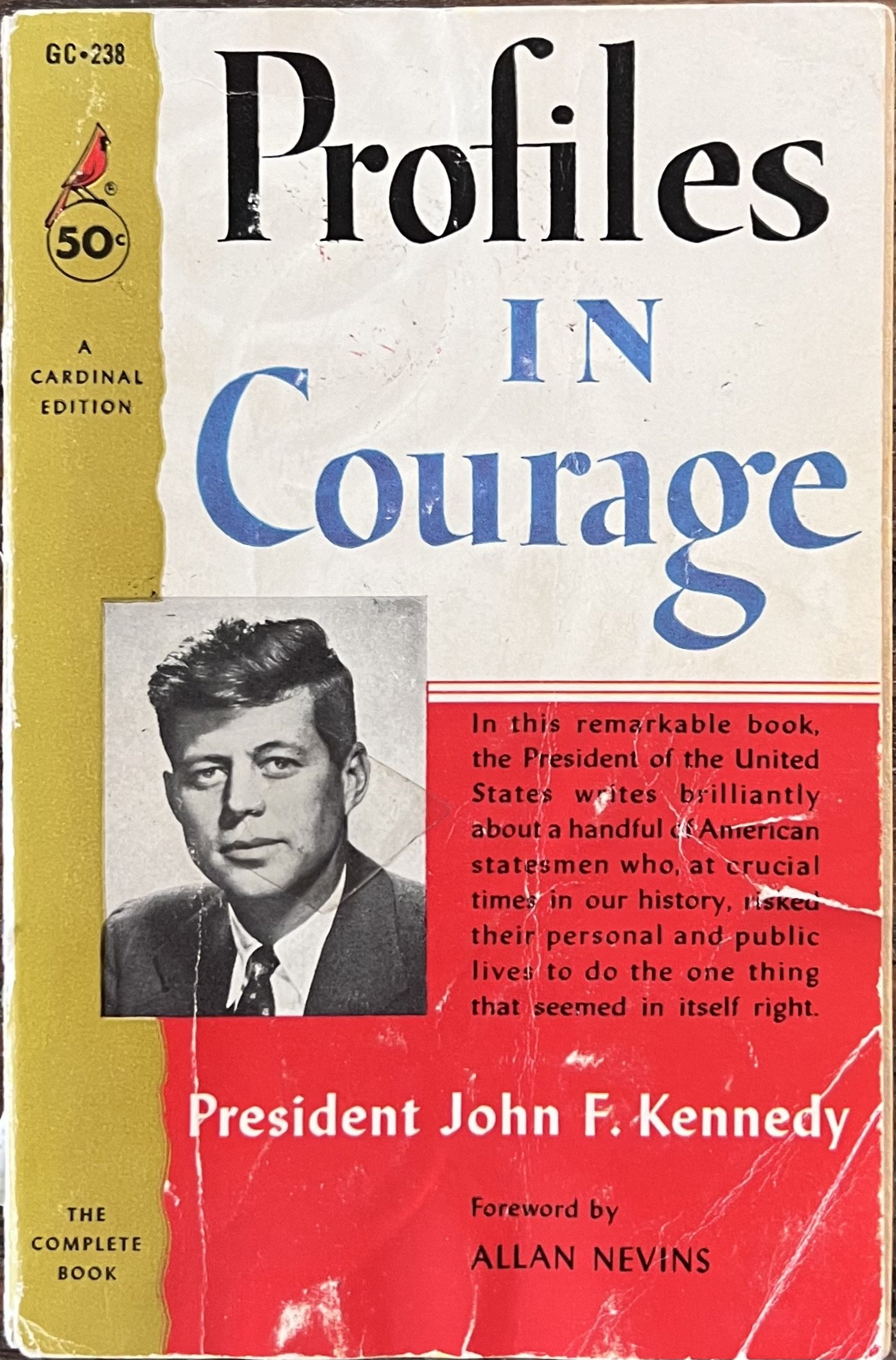Profiles in courage
Profiles in Courage written in 1956 by then Senator John F. Kennedy is a collection of eight biographies of U.S. senators who demonstrated political courage by taking unpopular stances, often against overwhelming pressures, and at great personal and professional risk.
“I have been interested in the problems of political courage in the face of constituent pressures, and the light shed on those problems by the lives of past statements. ”
Throughout this book, Kennedy’s eloquent prose reminds us of why this book is as relevant today as it was when it was written, in that he says (a key point and one that burns in my heart), that…
Kennedy makes a point in Profiles in Courage that at every time in American history, there has been a feeling that, much like political correspondent Walter Lippmann said, that:
‘…successful politicians are insecure and intimidated [people]. They advance politically only as they placate, appease, bribe, seduce, bamboozle, or otherwise manage to manipulate the demanding, threatening elements in their constituencies. The decisive consideration is not whether the proposition is good, but whether it it popular - not whether it will work well and prove itself, but whether the active-talking constituents like it immediately. (as cited by Kennedy: 1956:3).
Yet, Kennedy also, quite rightly states, that he saw, almost daily, acts of political courage amongst his peers and colleague in the Senate Chamber. And that his belief was that the opinion of politics and politicians at the time was at least partly due to the citizenry not fully understanding the responsibility or complexity that politicians carry. He wondered,
Throughout the book, Kennedy explores the courage it takes for politicians to stand firm in their beliefs, even when it puts them in opposition to the prevailing political climate or jeopardizes their career. The work serves as a tribute to individuals who chose principle over personal or political gain.
Here is a summary of the key profiles:
John Quincy Adams: He opposed the war with Mexico, which was popular at the time, because he believed it was unjust and would lead to the expansion of slavery.
Daniel Webster: Known for his famous "7th of March Speech," Webster supported the Compromise of 1850, which aimed to prevent civil war. He said, ‘Inconsistencies of opinion arising from changes of circumstances are often justifiable . But there is one sort of inconsistency that is culpable: it is the inconsistency between a man’s conviction and his vote, between his conscience and his conduct. No man shall ever charge me with an inconsistency of that kind.’ (pg 59)
Thomas Hart Benton: Benton, a senator from Missouri, was an advocate for westward expansion and the interests of common people, opposing the powerful elite who sought to drive his home state of Missouri into secession.
Sam Houston: He opposed the secession of Texas from the Union and was eventually ousted from his position as governor because of his stance against joining the Confederacy during the Civil War.
Edmund G. Ross: As a U.S. senator from Kansas, Ross cast the decisive vote to acquit President Andrew Johnson, who became President after the assassination of Abraham Lincoln, during his impeachment trial which was brought upon him for maintaining the goals of Lincoln. Ross was the deciding vote, and experienced immense pressure to convict Johnson whilst there was limited evidence available. Ross stated then, an idea that is as relevant as it is now, ‘…America could pass the danger point of partisan rule and that intolerance which so often characterises the sway of great majorities and makes them dangerous’.
Lucius Lamar: A senator from Mississippi, Lamar risked his political career by advocating for reconciliation between the North and South after the Civil War, as well as for civil rights for African Americans. Lamar, as one of the defining moments in his political career, opposed a large bill that would unjustly cause hardship to many. He stated,
‘Between the resolutions and my convictions there is a great gulf. I cannot pass it… upon the youth of my state whom it has been my privilege to assist in education I have always endeavoured to impress the belief that truth was better than falsehood, honesty better than policy, courage better than cowardice. Today my lessons confront me. Today I must be true or false, honest or cunning, faithful or unfaithful to my people. Even in this hour of their legislative displeasure and disapprobation, I cannot vote as these resolutions direct.’
George Norris: Norris opposed the U.S. entry into World War I and later fought against the political machines, advocating for progressive reforms like the direct election of senators.
8. Robert Taft: Known as "Mr. Republican," Taft defended what he regarded to be the traditional American concepts of law and justice. And for this was assumed to be an isolationist. However, Taft, a proud conservative, stated, ‘Liberalism implies particularly freedom of thought, freedom from orthodox dogma, the right of others to think differently from one’s self. It implies a free mind, open to new ideas and willing to give attentive consideration.’
Throughout the book, Kennedy explores the courage it takes for politicians to do their job. He offers the examples of the eight leaders not to say that there is a black vs white, right vs wrong ethics within politics, but as Abraham Lincoln so eloquently stated:
“There are few things wholly evil or wholly good. Almost everything, especially of government policy is an inseparable compound of the two, so that our best judgement of the preponderance between them is continually demanded.”




